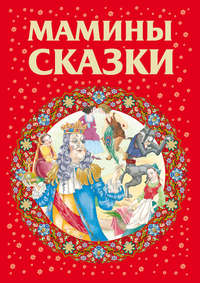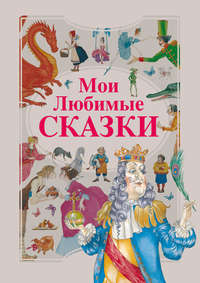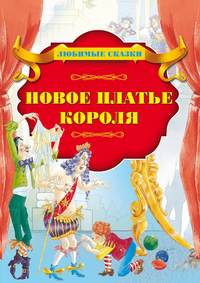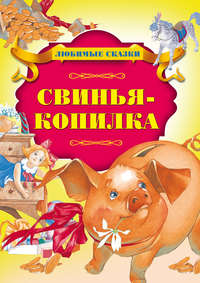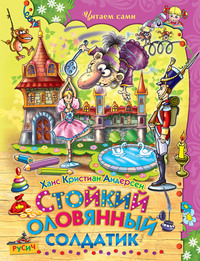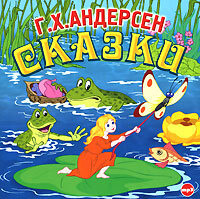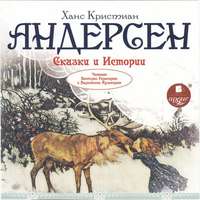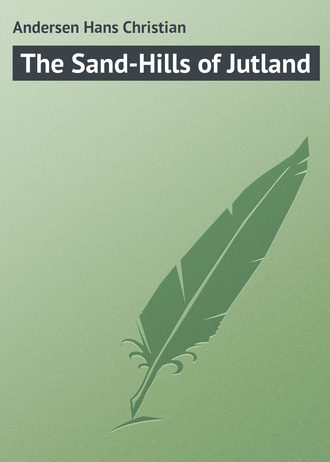 полная версия
полная версияПолная версия
The Sand-Hills of Jutland
Among those who had joined the spirit throng were his old foster-father and mother from Huusby-Klitter, and his kind friend Brönne and his wife; and at their side, but close to himself, sat their mild, lovely daughter. She held out her hand to him, Jörgen thought, and they went up to the altar where once they had knelt together; the priest joined their hands, and pronounced those words and that blessing which were to hallow for them life and love. Then music's tones peeled around – the organ, wind instruments, and voices combined – until there arose a volume of sound sufficient to shake the very tombstones over the graves.
Presently the little ship that hung under the roof moved towards him and Clara. It became large and magnificent, with silken sails and gilded masts; the anchor was of the brightest gold, and every rope was of silk cord, as described in the old song. He and his bride stepped on board, then the whole multitude in the church followed them, and there was room for all. He fancied that the walls and vaulted roof of the church turned into blooming elder and linden trees, which diffused a sweet perfume around. It was all one mass of verdure. The trees bowed themselves, and left an open space; then the ship ascended gently, and sailed out through the air above the sea. Every light in the church looked like a star. The wind commenced a hymn, and all sang with it: "In love to glory!" "No life shall be lost!" "Away to supreme happiness!" "Hallelujah!"
These words were his last in this world. The cord had burst which held the undying soul. There lay but a cold corpse in the dark church, around which the storm was howling, and which it was overwhelming with the drifting sand.
The next morning was a Sunday; the congregation and their pastor came at the hour of church service. The approach to the church had been almost impassable on account of the depth of the sand, and when at length they reached it, they found an immense sand-heap piled up before the door of the church – the drifting sand had closed up all entrance to its interior. The clergyman read a prayer, and then said that, as God had locked the doors of that holy house, they must go elsewhere and erect another for His service.
They sang a psalm, and retired to their homes.
Jörgen could not be found either at Skagen or amidst the sand-hills, where every search was made for him. It was supposed that the wild waves, which had rolled so far up on the sands, had swept him off.
But his body lay entombed in a large sarcophagus – in the church itself. During the storm God had cast earth upon his coffin – heavy piles of quicksand had accumulated there, and lie there even now.
The sand had covered the lofty arches, sand-thorns and wild roses grow over the church, where the wayfarer now struggles on towards its spire, which towers above the sand, an imposing tombstone over the grave, seen from miles around – no king had ever a grander one! None disturb the repose of the dead – none knew where Jörgen lay, until now – the storm sang the secret for me among the sand-hills!
The Mud-king's Daughter
The storks are in the habit of relating to their little ones many tales, all from the swamps and the bogs. They are, in general, suitable to the ages and comprehensions of the hearers. The smallest youngsters are contented with mere sound, such as "krible, krable, plurremurre." They think that wonderful; but the more advanced require something rational, or at least something about their family. Of the two most ancient and longest traditions that have been handed down among the storks, we are all acquainted with one – that about Moses, who was placed by his mother on the banks of the Nile, was found there by the king's daughter, was well brought up, and became a great man, such as has never been heard of since in the place where he was buried.
The other story is not well known, probably because it is a tale of home; yet it has passed down from one stork grandam to another for a thousand years, and each succeeding narrator has told it better and better, and now we shall tell it best of all.
The first pair of storks who related this tale had themselves something to do with its events. The place of their summer sojourn was at the Viking's loghouse, up by the wild morass, at Vendsyssel. It is in Hjöring district, away near Skagen, in the north of Jutland, speaking with geographical precision. It is now an enormous bog, and an account of it can be read in descriptions of the country. This place was once the bottom of the sea; but the waters have receded, and the ground has risen. It stretches itself for miles on all sides, surrounded by wet meadows and pools of water, by peat-bogs, cloudberries, and miserable stunted trees. A heavy mist almost always hangs over this place, and about seventy years ago wolves were found there. It is rightly called, the wild morass; and one may imagine how savage it must have been, and how much swamp and sea must have existed there a thousand years ago. Yes, in these respects the same was to be seen there as is to be seen now. The rushes had the same height, the same sort of long leaves, and blue-brown, feather-like flowers that they bear now; the birch tree stood with its white bark, and delicate drooping leaves, as now; and, in regard to the living creatures, the flies had the same sort of crape clothing as they wear now; and the storks' bodies were white, with black and red stockings. Mankind, on the contrary, at that time wore coats cut in another fashion from what they do in our days; but every one of them, serf or huntsman, whosoever he might be who trod upon the quagmire, fared a thousand years ago as they fare now: one step forward – they fell in, and sank down to the Mud-king, as he was called who reigned below in the great morass kingdom. Very little is known about his government; but that is, perhaps, a good thing.
Near the bog, close by Liimfjorden, lay the Viking's loghouse of three stories high, and with a tower and stone cellars. The storks had built their nest upon the roof of this dwelling. The female stork sat upon her eggs, and felt certain they would be all hatched.
One evening the male stork remained out very long, and when he came home he looked rumpled and flurried.
"I have something very terrible to tell thee," he said to the female stork.
"Thou hadst better keep it to thyself," said she. "Remember I am sitting upon the eggs: a fright might do me harm, and the eggs might be injured."
"But it must be told thee," he replied. "She has come here – the daughter of our host in Egypt. She has ventured the long journey up hither, and she is lost."
"She who is of the fairies' race? Speak, then! Thou knowest that I cannot bear suspense while I am sitting."
"Know, then, that she believed what the doctors said, which thou didst relate to me. She believed that the bog-plants up here could cure her invalid father; and she has flown hither, in the magic disguise of a swan, with the two other swan princesses, who every year come hither to the north to bathe and renew their youth. She has come, and she is lost."
"Thou dost spin the matter out so long," muttered the female stork, "the eggs will be quite cooled. I cannot bear suspense just now."
"I will come to the point," replied the male. "This evening I went to the rushes where the quagmire could bear me. Then came three swans. There was something in their motions which said to me, 'Take care; they are not real swans; they are only the appearance of swans, created by magic.' Thou wouldst have known as well as I that they were not of the right sort."
"Yes, surely," she said; "but tell me about the princess. I am tired of hearing about the swans."
"In the midst of the morass – here, I must tell thee, it is like a lake," said the male stork – "thou canst see a portion of it if thou wilt raise thyself up a moment – yonder, by the rushes and the green morass, lay a large stump of an alder tree. The three swans alighted upon it, flapped their wings, and looked about them. One of them cast off her swan disguise, and I recognised in her our royal princess from Egypt. She sat now with no other mantle around her than her long dark hair. I heard her desire the other two to take good care of her magic swan garb, while she ducked down under the water to pluck the flower which she thought she saw. They nodded, and raised the empty feather dress between them. 'What are they going to do with it?' said I to myself; and she probably asked herself the same question. The answer came too soon, for I saw them take flight up into the air with her charmed feather dress. 'Dive thou there!' they cried. 'Never more shalt thou fly in the form of a magic swan – never more shalt thou behold the land of Egypt. Dwell thou in the wild morass!' And they tore her magic disguise into a hundred pieces, so that the feathers whirled round about as if there were a fall of snow; and away flew the two worthless princesses."
"It is shocking!" said the lady stork; "I can't bear to hear it. Tell me what more happened."
"The princess sobbed and wept. Her tears trickled down upon the trunk of the alder tree, and then it moved; for it was the mud-king himself – he who dwells in the morass. I saw the trunk turn itself, and then there was no more trunk – it struck up two long miry branches like arms; then the poor child became dreadfully alarmed, and she sprang aside upon the green slimy coating of the marsh; but it could not bear me, much less her, and she sank immediately in. The trunk of the alder tree went down with her – it was that which had dragged her down: then arose to the surface large black bubbles, and all further traces of her disappeared. She is now buried in 'the wild morass;' and never, never shall she return to Egypt with the flower she sought. Thou couldst not have borne to have seen all this, mother."
"Thou hadst no business to tell me such a startling tale at a time like this. The eggs may suffer. The princess can take care of herself: she will no doubt be rescued. If it had been me or thee, or any of our family, it would have been all over with us."
"I will look after her every day, however," said the male stork; and so he did.
A long time had elapsed, when one day he saw that far down from the bottom was shooting up a green stem, and when it reached the surface a leaf grew on it. The leaf became broader and broader; close by it came a bud; and one morning, when the stork flew over it, the bud opened in the warm sunshine, and in the centre of it lay a beautiful infant, a little girl, just as if she had been taken out of a bath. She so strongly resembled the princess from Egypt, that the stork at first thought it was herself who had become an infant again; but when he considered the matter he came to the conclusion that she was the daughter of the princess and the mud-king, therefore she lay in the calyx of a water-lily.
"She cannot be left lying there," said the stork to himself; "yet in my nest we are already too overcrowded. But a thought strikes me. The Viking's wife has no children; she has much wished to have a pet. I am often blamed for bringing little ones. I shall now, for once, do so in reality. I shall fly with this infant to the Viking's wife: it will be a great pleasure to her."
And the stork took the little girl, flew to the loghouse, knocked with his beak a hole in the window-pane of stretched bladder, laid the infant in the arms of the Viking's wife, then flew to his mate, and unburdened his mind to her; while the little ones listened attentively, for they were old enough now to do that.
"Only think, the princess is not dead. She has sent her little one up here, and now it is well provided for."
"I told thee from the beginning it would be all well," said the mother stork. "Turn thy thoughts now to thine own family. It is almost time for our long journey; I begin now to tingle under the wings. The cuckoo and the nightingale are already gone, and I hear the quails saying that we shall soon have a fair wind. Our young ones are quite able to go, I know that."
How happy the Viking's wife was when, in the morning, she awoke and found the lovely little child lying on her breast! She kissed it and caressed it, but it screeched frightfully, and floundered about with its little arms and legs: it evidently seemed little pleased. At last it cried itself to sleep, and as it lay there it was one of the most beautiful little creatures that could be seen. The Viking's wife was so pleased and happy, she took it into her head that her husband, with all his retainers, would come as unexpectedly as the little one had done; and she set herself and the whole household to work, in order that everything might be ready for their reception. The coloured tapestry which she and her women had embroidered with representations of their gods – Odin, Thor, and Freia, as they were called – were hung up; the serfs were ordered to clean and polish the old shields with which the walls were to be decorated; cushions were laid on the benches; and dry logs of wood were heaped on the fireplace in the centre of the hall, so that the pile might be easily lighted. The Viking's wife laboured so hard herself that she was quite tired by the evening, and slept soundly.
When she awoke towards morning she became much alarmed, for the little child was gone. She sprang up, lighted a twig of the pine tree, and looked about; and, to her amazement, she saw, in the part of the bed to which she stretched her feet, not the beautiful infant, but a great ugly frog. She was so much disgusted with it that she took up a heavy stick, and was going to kill the nasty creature; but it looked at her with such wonderfully sad and speaking eyes that she could not strike it. Again she searched about. The frog gave a faint, pitiable cry. She started up, and sprang from the bed to the window; she opened the shutters, and at the same moment the sun streamed in, and cast its bright beams upon the bed and upon the large frog; and all at once it seemed as if the broad mouth of the noxious animal drew itself in, and became small and red – the limbs stretched themselves into the most beautiful form – it was her own little lovely child that lay there, and no ugly frog.
"What is all this?" she exclaimed. "Have I dreamed a bad dream? That certainly is my pretty little elfin child lying yonder." And she kissed it and strained it affectionately to her heart; but it struggled, and tried to bite like the kitten of a wild cat.
Neither the next day nor the day after came the Viking, though he was on the way, but the wind was against him; it was for the storks. A fair wind for one is a contrary wind for another.
In the course of a few days and nights it became evident to the Viking's wife how things stood with the little child – that it was under the influence of some terrible witchcraft. By day it was as beautiful as an angel, but it had a wild, evil disposition; by night, on the contrary, it was an ugly frog, quiet, except for its croaking, and with melancholy eyes. It had two natures, that changed about, both without and within. This arose from the little girl whom the stork had brought possessing by day her own mother's external appearance, and at the same time her father's temper; while by night, on the contrary, she showed her connection with him outwardly in her form, whilst her mother's mind and heart inwardly became hers. What art could release her from the power which exercised such sorcery over her? The Viking's wife felt much anxiety and distress about it, and yet her heart hung on the poor little being, of whose strange state she thought she should not dare to inform her husband when he came home; for he assuredly, as was the custom, would put the poor child out on the high road, and let any one take it who would. The Viking's good-natured wife had not the heart to allow this; therefore she resolved that he should never see the child but by day.
At dawn of day the wings of the storks were heard fluttering over the roof. During the night more than a hundred pairs of storks had been making their preparations, and now they flew up to wend their way to the south.
"Let all the males be ready," was the cry. "Let their mates and little ones join them."
"How light we feel!" said the young storks, who were all impatience to be off. "How charming to be able to travel to other lands!"
"Keep ye all together in one flock," cried the father and mother, "and don't chatter so much – it will take away your breath."
So they all flew away.
About the same time the blast of a horn sounding over the heath gave notice that the Viking had landed with all his men; they were returning home with rich booty from the Gallic coast, where the people, as in Britain, sang in their terror, —
"Save us from the savage Normands!"What life and bustle were now apparent in the Viking's castle near "the wild morass!" Casks of mead were brought into the hall, the pile of wood was lighted, and horses were slaughtered for the grand feast which was to be prepared. The sacrificial priests sprinkled with the horses' warm blood the slaves who were to assist in the offering. The fires crackled, the smoke rolled up under the roof, the soot dropped from the beams; but people were accustomed to that. Guests were invited, and they brought handsome gifts; rancour and falseness were forgotten – they all became drunk together, and they thrust their doubled fists into each other's faces – which was a sign of good-humour. The skald – he was a sort of poet and musician, but at the same time a warrior – who had been with them, and had witnessed what he sang about, gave them a song, wherein they heard recounted all their achievements in battle, and wonderful adventures. At the end of every verse came the same refrain, —
"Fortune dies, friends die, one dies one's self; but a glorious name never dies."
And then they all struck on their shields, and thundered with their knives or their knuckle-bones on the table, so that they made a tremendous noise.
The Viking's wife sat on the cross bench in the open banquet hall. She wore a silk dress, gold bracelets, and large amber beads. She was in her grandest attire, and the skald named her also in his song, and spoke of the golden treasure she had brought her husband; and he rejoiced in the lovely child he had only seen by daylight, in all its wondrous beauty. The fierce temper which accompanied her exterior charms pleased him. "She might become," he said, "a stalwart female warrior, and able to kill a giant adversary." She never even blinked her eyes when a practised hand, in sport, cut off her eyebrows with a sharp sword.
The mead casks were emptied, others were brought up, and these, too, were drained; for there were folks present who could stand a good deal. To them might have been applied the old proverb, "The cattle know when to leave the pasture; but an unwise man never knows the depth of his stomach."
Yes, they all knew it; but people often know the right thing, and do the wrong. They knew also that "one wears out one's welcome when one stays too long in another man's house;" but they remained there for all that. Meat and mead are good things. All went on merrily, and towards night the slaves slept amidst the warm ashes, and dipped their fingers into the fat skimmings of the soup, and licked them. It was a rare time!
And again the Viking went forth on an expedition, notwithstanding the stormy weather. He went after the crops were gathered in. He went with his men to the coast of Britain – "it was only across the water," he said – and his wife remained at home with her little girl; and it was soon to be seen that the foster-mother cared almost more for the poor frog, with the honest eyes and plaintive croaking, than for the beauty who scratched and bit everybody around.
The raw, damp, autumn, mist, that loosens the leaves from the trees, lay over wood and hedge; "Birdfeatherless," as the snow is called, was falling thickly; winter was close at hand. The sparrows seized upon the storks' nest, and talked over, in their fashion, the absent owners. They themselves, the stork pair, with all their young ones, where were they now?
The storks were now in the land of Egypt, where the sun was shining warmly as with us on a lovely summer day. The tamarind and the acacia grew there; the moonbeams streamed over the temples of Mahomet. On the slender minarets sat many a pair of storks, reposing after their long journey; the whole immense flock had fixed themselves, nest by nest, amidst the mighty pillars and broken porticos of temples and forgotten edifices. The date tree elevated to a great height its broad leafy roof, as if it wished to form a shelter from the sun. The grey pyramids stood with their outlines sharply defined in the clear air towards the desert, where the ostrich knew he could use his legs; and the lion sat with his large grave eyes, and gazed on the marble sphinxes that lay half imbedded in the sand. The waters of the Nile had receded, and a great part of the bed of the river was swarming with frogs; and that, to the stork family, was the pleasantest sight in the country where they had arrived. The young ones were astonished at all they saw.
"Such are the sights here, and thus it always is in our warm country," said the stork-mother good-humouredly.
"Is there yet more to be seen?" they asked. "Shall we go much further into the country?"
"There is nothing more worth seeing," replied the stork-mother. "Beyond this luxuriant neighbourhood there is nothing but wild forests, where the trees grow close to each other, and are still more closely entangled by prickly creeping plants, weaving such a wall of verdure, that only the elephant, with his strong clumsy feet, can there tread his way. The snakes are too large for us there, and the lizards too lively. If ye would go to the desert, ye will meet with nothing but sand; it will fill your eyes, it will come in gusts, and cover your feathers. No, it is best here. Here are frogs and grass-hoppers. I shall remain here, and so shall you."
And they remained. The old ones sat in their nest upon the graceful minaret; they reposed themselves, and yet they had enough to do to smooth their wings and rub their beaks on their red stockings; and they stretched out their necks, saluted gravely, and lifted up their heads with their high foreheads and fine soft feathers, and their brown eyes looked so wise.
The female young ones strutted about proudly among the juicy reeds, stole sly glances at the other young storks, made acquaintances, and slaughtered a frog at every third step, or went lounging about with little snakes in their bills, which they fancied looked well, and which they knew would taste well.
The male young ones got into quarrels; struck each other with their wings; pecked at each other with their beaks, even until blood flowed. Then they all thought of engaging themselves – the male and the female young ones. It was for that they lived, and they built nests, and got again into new quarrels; for in these warm countries every one is so hot-headed. Nevertheless they were very happy, and this was a great joy to the old storks. Every day there was warm sunshine – every day plenty to eat. They had nothing to think of except pleasure. But yonder, within the splendid palace of their Egyptian host, as they called him, there was but little pleasure to be found.
The wealthy, mighty chief lay upon his couch, stiffened in all his limbs – stretched out like a mummy in the centre of the grand saloon with the many-coloured painted walls: it was as if he were lying in a tulip. Kinsmen and servants stood around him. Dead he was not, yet it could hardly be said that he lived. The healing bog-flower from the faraway lands in the north – that which she was to have sought and plucked for him – she who loved him best – would never now be brought. His beautiful young daughter, who in the magic garb of a swan had flown over sea and land away to the distant north, would never more return. "She is dead and gone," had the two swan ladies, her companions, declared on their return home. They had concocted a tale, and they told it as follows: —
"We had flown all three high up in the air when a sportsman saw us, and shot at us with his arrow. It struck our young friend; and, slowly singing her farewell song, she sank like a dying swan down into the midst of the lake in the wood. There, on its banks, under a fragrant weeping birch tree, we buried her. But we took a just revenge: we bound fire under the wings of the swallow that built under the sportman's thatched roof. It kindled – his house was soon in flames – he was burned within it – and the flames shone as far over the sea as to the drooping birch, where she is now earth within the earth. Alas! never will she return to the land of Egypt."




